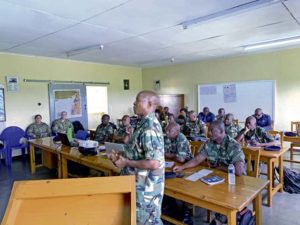
Airmen from U.S. Air Forces Africa conducted force development training with the Malawian Air Force, Jan. 13-17, in Malawi. Force development training such as this provides an opportunity for the U.S. Air Force to enhance relations, share ideas and build partnership capability in the region.
“This is a very important partnership for us and right now the force development program is helping us lay the foundation of the Malawian air force, said Maj. Gen. Andrew Lapken Namathanga, Commander, Malawi air force.
“I am very excited because the establishment of the force development program here three years ago has brought a foundation during the transition period for the development of our air force. It is through the program that the Malawian air force airmen are becoming knowledgeable on how an air force functions. Now, our airmen are all equipped with air knowledge and able to execute roles and functions in our air force because of this program.”
Since 2018 the USAFE-AFAFRICA Manpower, Personnel and Services Directorate, Force Development team, has been coming to Malawi to partner with the Malawian air force to provide them with tools to build, sustain and stand-up an independent air force. Up until August 2019, the Malawian air force was not a separate service within the Malawian defense force. Since that time, the newly separate service has expressed continued partnership with the U.S. Air Force resulting in events like this.
“This program gives us a chance to share ideas, how to meet current threats and various challenges in terms of human resources, said Mr. Noel Fachi, program manager, USAFE-AFAFRICA Force Development.
“Our program brings our partner nations together to try and solve African problems. By providing frameworks for how to address most of these challenges, we bring partners together to collaborate, share ideas and come up with solutions to answer those challenges.”
One unique element about the force development program is its low cost but lasting ability to have a huge impact, according to Fachi. He highlighted the fact that because of their program, they are able to conduct engagements with countries in Africa more frequently throughout the year. This leads to creating trusted partnerships with those countries and ultimately leads to greater interoperability with our partners across Africa.
Fachi also highlighted how the Malawian air force has been an eager and excited partner to work with over the last few years.
“To have an air chief and a deputy air chief sit in every single event when we have been here, day in and day out, it shows you how serious they are,” said Fachi. “They have empowered their airmen.”
The majority of events during the week revolved around the sharing of ideas related to the U.S. Air Force’s Deployment Transition Center, located at Ramstein Air Base. The Malawian air force routinely deploys to the Democratic Republic of Congo and expressed interest in developing their own deployment transition center for their airmen returning from deployments.
“I think it is imperative to have our own center because currently we do not have one within the Malawian defense force and we have seen the effects of the experiences the troops are facing in the mission area,” says Namathanga.
During the week, members from the U.S. Air Force Deployment Transition Center shared how the U.S. executes their program to help integrate Airmen back from a deployment into their home station environment. They provided the Malawian air force with recommendations on ways they could establish their own program to assist their own airmen who come home from deployments.
The week concluded with an event where the Malawian and U.S. Air Force came together to thank each other for the opportunities over the course of the week to learn from each other. Namathanga concluded by thanking the U.S. Air Force for their role as their country transitions to an independent air force. He is excited to see where their air force will go in the future because of the tools the U.S. shared with them to build a foundation to succeed from.


